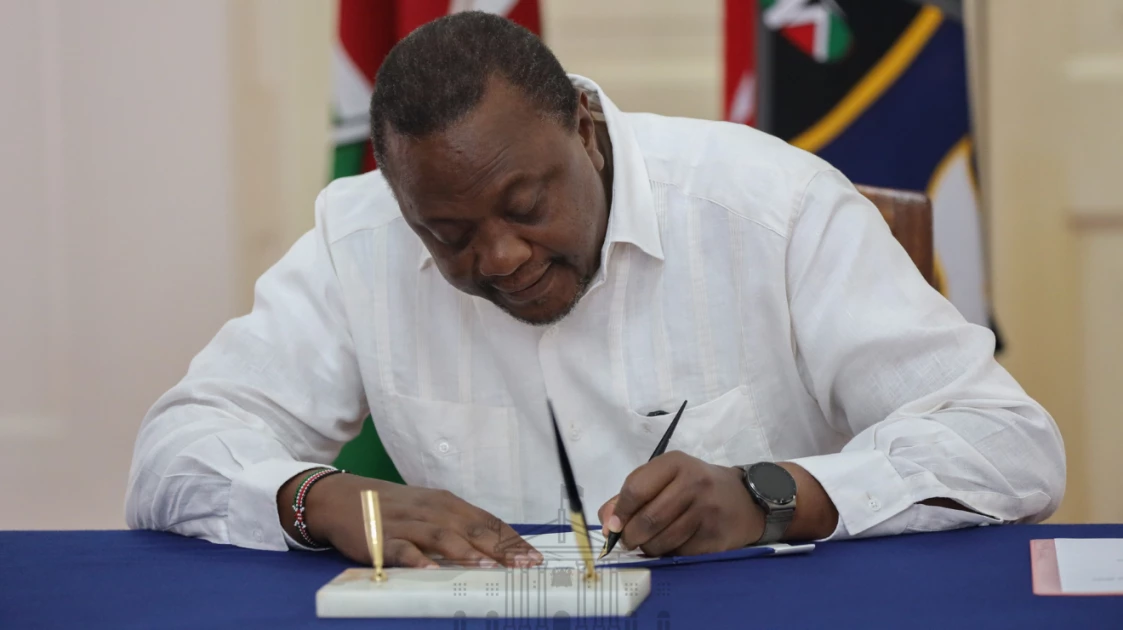Explainer: Insights on ICT bill being opposed by Kenyans

Eyes on President Uhuru as ICT bill awaits signing. PHOTO/State House.
The Kenyan
Parliament last week passed the ICT bill that that requires the training,
registrations licensing and a standard for practitioners in this field.
Introduced
to parliament by Garissa Township MP Aden Duale and supported by nominated MP
Godfrey Osotsi in 2016, the bill required ICT practitioners to be licensed and
registered by a council.
Additionally,
the practitioners are required to have acquired University education in the
field, after which they would pay an annual fee to a body.
After its
withdrawal in 2016, Osotsi then presented the bill that was rejected 2018 and
presented again in 2020.
The bill
that was eventually passed last week and now awaits President Uhuru Kenyatta’s
signature to become a law has sparked outrage among the ICT community, who are
unpleased by the law preventing some professionals from practicing.
This
prompted a petition to stop the signing of the bill that has so far garnered
over 12,000 signatures on the Change.org platform.
Speaking to
Citizen Digital, Internet Governance lawyer Mercy Mutemi said that the decision
to enact the bill into law now solely lies in the hands of the head of state.
Mercy says
at this point, ICT Cabinet secretary Joe Mucheru could use his influence on
Uhuru to pursue him not to sign the bill into law.
On Saturday,
the CS took to social media to assure ICT practitioners that he will safeguard
the sector.
“This ICT Bill is a private member's
bill. As a Ministry we continuously fought against this bill in its various
forms. The political season comes with all manner of surprises including failed
assurances by the people responsible. I will do my part to safeguard our
thriving sector,”Mucheru wrote in a tweet.
On the
numerous petitions signed by Kenyans online, Mercy said they will need to back
it with a solid support which includes writing to the president officially or
through relevant bodies.
“What ICT
practitioners need to do in order to prevent the law from being signed by the president
is write letters to the President instead. The petitions being signed on Change
might never reach him or could not be solid enough to get his attention,” Mercy
advised.
She further
noted that if enacted to law by the president, the sector might lose its top
talents who are self-taught.
“The law
will derail the milestones that have been made in the ICT sector. This might
even lead to loss of jobs, mind you some of the most competent ICT
practitioners in the field right now did not pursue any course, or have
exemplary skills that they were not even taught in school. There are good ICT
professionals who are self-taught.”
On Sunday,
Azimio Presidential candidate Raila Odinga opposed the bill, saying there was
no clear indication of what the powers passed to the ICT sector will mean.
"I find the move to regulate ICT Practitioners
impractical and counter-productive. It negates the goals and visions of the
National ICT Policy and Digital Strategies," the ODM leader said.
Raila added that the bill will also limit innovation in the dynamic ICT industry.
Want to send us a story? SMS to 25170 or WhatsApp 0743570000 or Submit on Citizen Digital or email wananchi@royalmedia.co.ke
Comments
No comments yet.


Leave a Comment